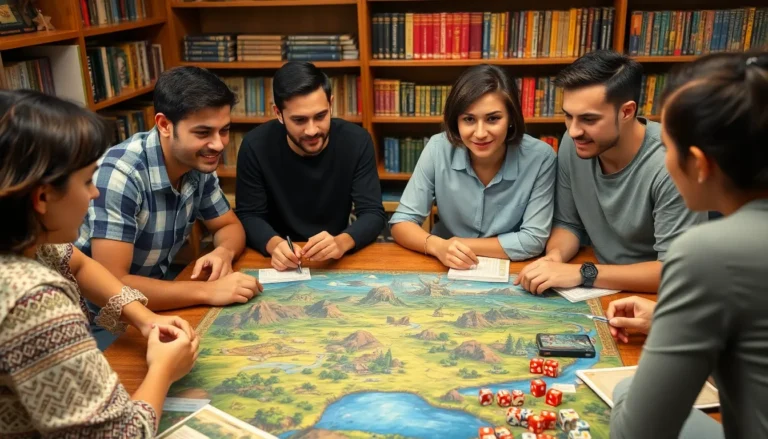In the vast world of gaming, single-player RPGs have carved out a unique niche, captivating players with their rich narratives and immersive experiences. These games invite players to step into the shoes of a hero, exploring expansive worlds filled with intricate lore, engaging quests, and unforgettable characters. As players embark on their journeys, they not only face challenges but also shape their destinies through choices that resonate throughout the game.
The allure of single-player RPGs lies in their ability to offer a personalized adventure. Unlike multiplayer games, they allow players to delve deep into a story at their own pace, forging connections with the game’s universe. Whether battling fierce monsters or forging alliances, the experience is both thrilling and introspective, making single-player RPGs a beloved genre for gamers seeking solitude and storytelling.
Table of Contents
ToggleOverview of Single-Player RPGs
Single-player RPGs immerse players in expansive, detailed worlds. Players take on the role of customized characters, experiencing extensive narratives shaped by choices. These games offer quests with varying complexities, from straightforward missions to intricate storylines involving multiple factions and characters.
Single-player RPGs often feature turn-based combat, real-time action mechanics, or a blend of both. Each gameplay style demands strategic thinking and skillful execution. The character development system allows players to enhance abilities, unlocking new gameplay possibilities and deepening engagement with the game.
Themes in single-player RPGs range from classic fantasy and sci-fi to complex moral dilemmas. Players encounter richly crafted environments, inhabited by creatures and NPCs that enhance the storytelling. These elements create an engaging atmosphere that encourages exploration and experimentation.
Single-player RPGs also introduce in-game economy systems or crafting mechanics. Players can collect resources, upgrade equipment, or trade items, adding layers to the gameplay experience. This depth fosters a sense of accomplishment and progression as players navigate their unique journeys through the game worlds.
Popular titles in this genre, such as “The Witcher 3: Wild Hunt,” “Persona 5,” and “Skyrim,” exemplify the richness and diversity of single-player RPGs. Each game showcases unique mechanics and compelling narratives, attracting varied audiences and establishing the genre’s enduring legacy.
Key Features of Single-Player RPGs

Single-player RPGs feature several key elements that make them distinct and engaging. These components enhance immersion and foster deeper connections between players and the game world.
Storytelling and Narrative
Storytelling serves as the backbone of single-player RPGs, often featuring intricate plots and rich lore. Players embark on epic quests where decisions significantly impact the narrative’s direction, yielding multiple endings. Game developers invest in character-driven stories, creating memorable protagonists and complex antagonists. The seamless integration of side quests expands the main plot, allowing for deeper world exploration and interaction with diverse characters. Titles like “The Witcher 3: Wild Hunt” excel in this area, showcasing intricate narrative webs that reward exploration and choice.
Character Development and Customization
Character development and customization contribute significantly to player engagement. Players create avatars with unique appearances and skill sets, fostering personal investment in the journey. Progression systems often feature leveling up, skill trees, and customizable abilities, allowing players to tailor their gameplay experience. Games like “Skyrim” enable extensive customization options, giving players freedom to develop characters that match their playstyle. This personalization not only enhances usability but also strengthens the emotional bond between players and their characters as they navigate challenges and evolve throughout their adventure.
Popular Single-Player RPG Titles
Single-player RPGs boast numerous iconic titles that exemplify engaging storytelling and immersive gameplay. This section highlights both classic favorites and modern releases that have left a significant mark on the genre.
Classic Titles
- Baldur’s Gate II: Shadows of Amn
Baldur’s Gate II features deep narrative choices and strategic turn-based combat, allowing players to engage deeply with its characters and world.
- Final Fantasy VII
Final Fantasy VII blends compelling storytelling with memorable characters, offering an expansive world filled with rich lore and engaging side quests.
- The Elder Scrolls III: Morrowind
Morrowind introduces players to a vast open world where decisions shape the narrative, showcasing complex character development and extensive lore.
- Chrono Trigger
Chrono Trigger combines time travel with unique gameplay mechanics, allowing players to influence events and experience multiple endings.
- Planescape: Torment
Planescape: Torment focuses heavily on narrative and character interaction, challenging players to explore philosophical themes in a unique fantastical setting.
Modern Releases
- The Witcher 3: Wild Hunt
This title offers a richly detailed open world and intricate narrative arcs shaped by player choices, featuring a mix of intense combat and deep character development.
- Cyberpunk 2077
Combining RPG elements with a futuristic setting, Cyberpunk 2077 provides a dynamic story experience and character customization options in a sprawling metropolis.
- Persona 5
Persona 5 blends traditional RPG gameplay with life simulation elements, allowing players to balance relationships and combat while progressing through a captivating story.
- Elden Ring
Elden Ring delivers an expansive world filled with secrets, challenging combat, and intricate lore, allowing players to forge their own paths through its vast landscapes.
- Divinity: Original Sin 2
This title emphasizes tactical, turn-based combat and collaborative storytelling, providing a strong narrative experience enriched by strategic gameplay choices.
Gameplay Mechanics in Single-Player RPGs
Single-player RPGs feature diverse gameplay mechanics that enhance immersion and player engagement. Key elements include combat systems and exploration mechanics that define the player’s experience.
Combat Systems
Combat systems play a crucial role in single-player RPGs, offering varied styles and strategies.
- Turn-Based Combat: This system emphasizes tactical decision-making, allowing players to plan moves and counteractions. Games like “XCOM” exemplify this mechanic.
- Real-Time Combat: This approach demands quick reflexes and real-time strategy, evident in titles such as “Dark Souls,” where timing and skill heavily influence outcomes.
- Hybrid Systems: Many titles incorporate both turn-based and real-time elements, providing flexibility. “Final Fantasy XV” offers an example with its active time battle system.
- Character Abilities: Each character typically possesses unique skills and abilities, influencing combat styles. Players tailor their approach based on character strengths, leading to diverse strategic options.
- Difficulty Settings: Many RPGs allow players to adjust difficulty, catering to various skill levels and preferences. This customization enhances accessibility and player satisfaction.
Exploration and World-Building
Exploration and world-building create the foundation for immersive experiences in single-player RPGs.
- Open Worlds: Many RPGs feature expansive worlds filled with diverse biomes, allowing players to traverse mountains, forests, and cities. Titles like “Skyrim” illustrate this aspect with vast landscapes and hidden secrets.
- Interactive Environments: Engaging with environmental elements enhances immersion. Players can interact with objects, solve puzzles, and uncover hidden lore within the game world.
- Side Quests: Supplemental quests enrich the main storyline, enabling deeper character interaction and lore exploration. These quests often reveal character backgrounds and world history, adding depth.
- Lore Integration: Single-player RPGs frequently incorporate lore through in-game texts, dialogues, and environmental storytelling. This method allows players to piece together narratives at their own pace.
- Dynamic Events: Some games introduce dynamic events that change based on player actions, creating a living world. These events can alter quests, NPC interactions, and overall world status.
These mechanics not only define single-player RPGs but also contribute to the genre’s enduring appeal by creating intricate narratives and engaging gameplay experiences.
Single-player RPGs stand out in the gaming landscape for their ability to deliver immersive experiences and rich narratives. They invite players into expansive worlds where choices matter and personal connections flourish. With their blend of strategic gameplay and emotional storytelling these games offer a unique escape that resonates deeply with those who appreciate solitary adventures.
As the genre continues to evolve it remains a beloved choice for gamers seeking both challenge and introspection. The enduring appeal of iconic titles showcases the power of storytelling and character development in crafting unforgettable journeys. Single-player RPGs not only entertain but also inspire players to explore their own narratives within the vast realms they inhabit.






